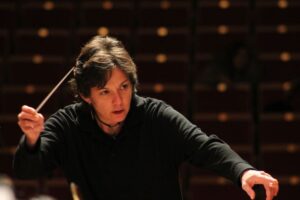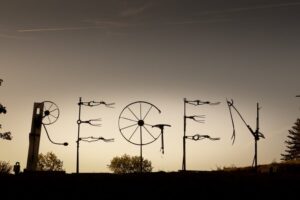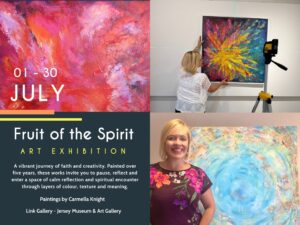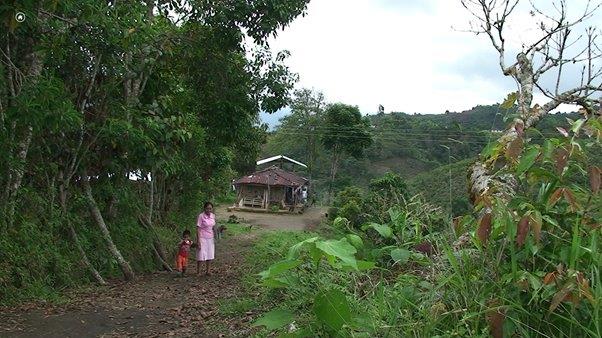
2024 marks the 30th anniversary of the Fairtrade mark, the symbol which can now be found on 5,000 products in our shops – everything from ice cream to face cream, T-shirts and tea, coffee, sugar, chocolate, bananas and even wine.
Cathy Le Feuvre met Mike Gidney, chief executive of the Fairtrade Foundation, during a visit late last year to celebrate the renewal of Jersey’s status as a Fairtrade Island.
The previous evening, Mike had been guest of honour at a dinner organised by the Jersey Fairtrade Island Group. Here he presented the then Assistant Environment Minister Deputy Hilary Jeune, who previously worked for Fairtrade, and the outgoing chair of the Fairtrade Island Group, Tony Allchurch, with a certificate to recognise the renewal of Jersey’s status as a Fairtrade Island. This status was first granted in 2005, after years of campaigning by enthusiasts including the late Ed Le Quesne, who first encouraged Tony to get involved.
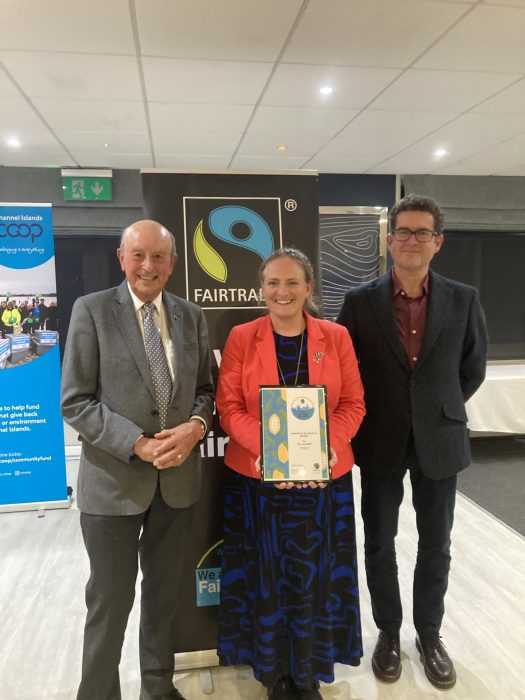
Fairtrade prices and premiums are also helping poor smallholder farmers tackle climate change, which is hitting them hard.
The concept of Fairtrade, Mike explained, was perfectly encapsulated by one young JCP pupil during the school assembly.
‘She just said Fairtrade is about a better deal, putting more money in the hands of the farmers, and showing you care. She absolutely nailed it. It’s quite simple really, but it’s transformative if we all do it together.
‘Fairtrade is becoming part of life and that’s incredibly important for farmers because every time shoppers buy a Fairtrade product a guaranteed benefit goes back to the farmers. This helps them plan and invest and build stronger farms, stronger communities. It’s trade, not aid! But none of that is possible without people looking for that Fairtrade mark.’
The Fairtrade Foundation now works with 2 million farmers in 75 countries across Latin America, Africa and Asia and there are two financial aspects to Fairtrade.
‘One is a guaranteed minimum price that goes directly into the hands of the farmer. So, a smallholder cocoa farmer in Ivory Coast growing cocoa for our chocolate bars will get an absolute guaranteed minimum price for her cocoa, without question. But on top of that, there’s an extra premium, which is about a 10% bonus, which goes to her community, very often a co-operative. And it’s that premium that communities use to invest in big projects like schools, hospitals and healthcare,’ Mike said.
‘Increasingly, we’re seeing Fairtrade communities using the extra premium their communities receive to invest in adaptation and mitigation against the climate crisis – including better irrigation and planting shade trees to protect things like cocoa and coffee, which are quite vulnerable to too much sun exposure. But that all costs money, and when you’re still paid below the cost of production, adapting to the climate crisis is really tough. That’s where Fairtrade is more important now than ever.’
Is Fairtrade making farmers in Africa and Asia ‘rich’?
‘No. We call the Fairtrade minimum price a “minimum” price for a reason. It’s just the floor. It’s what we calculate as the basic level of price needed for people just to be able to make ends meet. It would be wonderful to see farmers being able to go beyond that and there are certain companies who do pay more than the Fairtrade minimum price. But the minimum is there for a reason. It’s a safety net. And that allows the farmers to plan, to invest.’
Fairtrade prices help smallholder farmers look after their families and send their kids to school rather than making them work on the farms.
‘If you want to tackle child labour, which is a big problem in agriculture around the world, you have to recognise that it’s linked to poverty,’ Mike said.
Do Fairtrade farmers work directly with big companies?
‘That depends on the supply chain. Something like bananas is quite a short supply chain. But if you’re making a chocolate bar, you might get your nuts from one place your sugar from another, your cocoa from another. So very often they will have to use big traders in the middle, but we try and encourage where possible these direct relationships. The more a big supermarket can really know what’s going on at the farm level, the more their understanding grows, the more they understand the importance of fair pricing, the more they can work together on the shared challenges of the climate crisis.
‘Fairtrade for me is really about consumer power. We have more power to bring about change than you might expect. You might think … what difference does it make if I buy a Fairtrade cup of coffee versus a non-Fairtrade cup of coffee? Well, actually, all of us doing that all around the world, and you can get Fairtrade in 125 countries, makes a massive difference. Globally, Fairtrade just in the premium alone, the extra bonus that goes to the farming groups, generated €200 million in 2022. That’s an awful lot of investment.’
Shouldn’t we all be trying to buy local before shipping food and other products halfway across the world?
‘The way to think about it is … if you can buy local, buy local! Support your local farmers. But if you are looking to buy things that you can’t buy on the Island or you can’t buy in your local community, make it Fairtrade!’
There’s no doubt that in the past 30 years, Fairtrade has come a long way and has probably been more successful than anyone dared to dream at the start. But Mike and his Foundation still face big challenges, including helping the two million farmers they work with across the globe move beyond just receiving that minimum price for their products. Helping them to become more organised and to have a place at decision making tables is part of the future, helping them to become less beholden to big business and even to become part of high-level intergovernmental talks like COP where, at the moment, ‘political suits’ usually unconnected to agriculture tend to talk for producers.
The enthusiasm of the younger generation, including the pupils at JCP who Mike spent time with, is also crucial to the future of Fairtrade.
‘They understand fairness. It starts in the playground. Who’s got the ball? What are the rules of the game? Who’s who? That sense of justice is hard wired into students and if you can start to get them to think about using their power as citizens and as shoppers, eventually that’s how we start to build a better world.
‘Companies only respond to Fairtrade because they understand that it matters to the public. They give customers what they think the customers want. If there wasn’t public support, like here in the school, across Jersey and all of the different communities, in faith groups … companies would just stop being involved. It’s the most powerful way of persuading companies to stock Fairtrade products, to convert more of their products to Fairtrade, which in turn benefits the farmers, which then of course benefits us as consumers.
And the future, as Jersey enters its next phase of life with its renewed status as a Fairtrade Island, and as Tony Allchurch stands down as the ‘phenomenal’ chair of the local group?
‘I get a really strong sense of community support in Jersey for Fairtrade, which is for me really inspiring, because it just sustains me in what I’m trying to do as well.
‘I think sometimes the world can seem daunting and depressing, and Fairtrade is just a little bit of hope that together we can build a better future. The wonderful thing about it is … it doesn’t really need to cost you any more, and it doesn’t need to take you out of your daily life. You can just start to change the world bit by bit when you go shopping.’
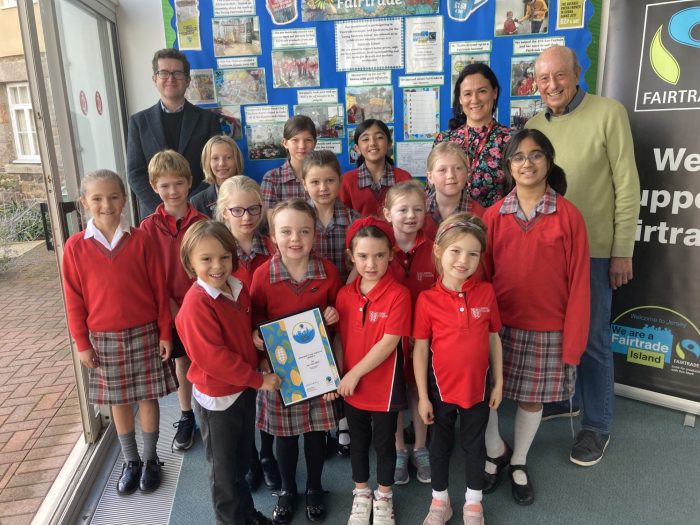
JCP Eco Team with Mike Gidney, Tony Allchurch and JCP teacher and Eco Team leader Andrea Christopher
A shorter version of this interview appears in the Spring 2024 issue of RURAL magazine


